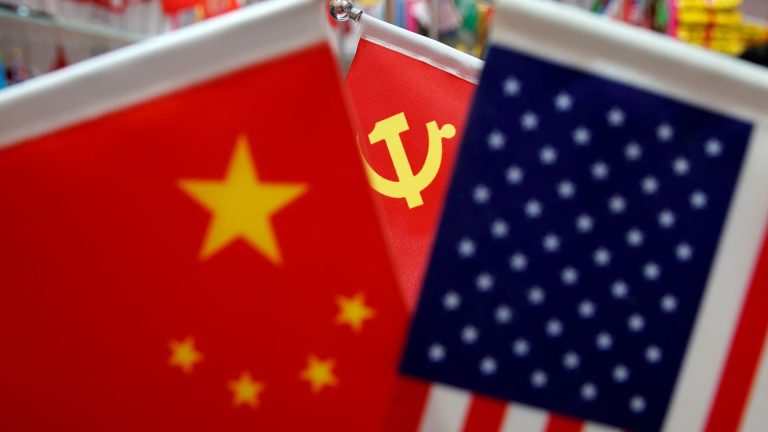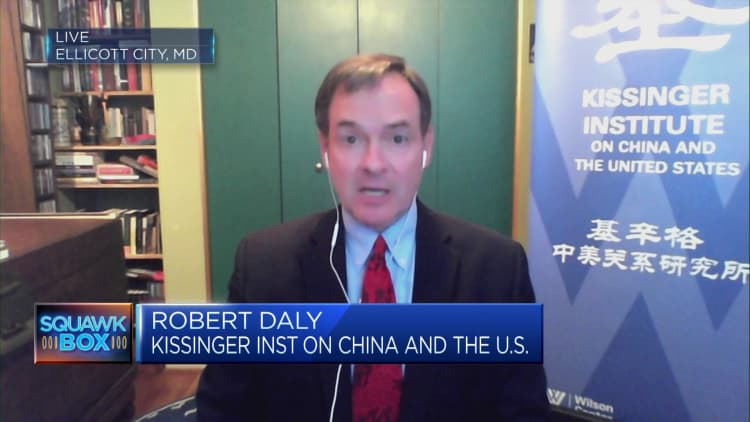
[ad_1]
Blinken’s trip to Beijing over the last two days — the secretary’s first under the Biden administration — marked a resumption of high-level U.S.-China government meetings after a tense four-plus months.
Aly Song | Reuters
BEIJING — U.S. Secretary of State Antony Blinken said Monday he failed to revive military-to-military talks with China, despite earlier hopes of reopening that communication channel.
Blinken’s trip to Beijing over the last two days — the secretary’s first under the Biden administration — marked a resumption of high-level U.S.-China government meetings after a tense four-plus months.
Military communication had dropped off during that time.
China’s Defense Ministry declined a call with its U.S. counterpart in early February after the discovery of an alleged Chinese spy balloon over U.S. airspace. Both countries’ defense heads attended an annual event in Singapore earlier this month, but they did not have a formal meeting.
The balloon incident delayed Blinken’s visit to Beijing by more than four months. The secretary arrived Sunday and had meetings with Chinese President Xi Jinping, Director of the Chinese Communist Party’s Central Foreign Affairs Office Wang Yi, and State Councilor and Foreign Minister Qin Gang.
Blinken told NBC News on Monday that the spy balloon “chapter should be closed.”

He also told reporters Monday that during the meetings, he “repeatedly” raised the need for direct communication between the two countries’ militaries.
“I think it’s absolutely vital that we have these kinds of communications, military to military,” Blinken said. “That imperative, I think, was only underscored by recent incidents that we saw in the air and on the seas.”
“At this moment, China does not agree to move forward with that,” he said, noting the U.S. would keep working toward restoring those communication channels.
The U.S. shot down the alleged Chinese spy balloon in February. Beijing maintains it was a weather balloon that blew off course.
Earlier this month, the U.S. Indo-Pacific Command said a China warship came within 150 yards of a U.S. destroyer in the Taiwan Strait.
Beijing considers Taiwan part of its territory, with no right to independently conduct diplomatic relations. The U.S. recognizes Beijing as the sole government of China but maintains unofficial relations with Taiwan, a democratically self-governed island.
U.S. sanctions at play
An issue for the Chinese is that the U.S. has sanctioned Li Shangfu, China’s minister of national defense.
The U.S. sanctioned Li in 2018 while he was head of China’s Equipment Development Department and oversaw Chinese purchases of Russian combat aircraft and equipment.
When asked in May whether those sanctions would be lifted, even for negotiation purposes, the U.S. State Department spokesperson said no.
“You can’t have sanctions on one side” and discussions on the other, said Shen Yamei, director and associate research fellow at state-backed think tank China Institute of International Studies’ department for American studies. That’s according to a CNBC translation of her Mandarin-language remarks.
She generally described Blinken’s trip to Beijing as a “very good turning point.”
Shen previously told CNBC that Beijing declined to pick up a military hotline phone call because doing so would be an acknowledgement that the situation was tense — and prompt more extreme U.S. action.
China frequently didn’t answer the phone — a hotline set up for emergencies.
Leading up to Blinken’s trip to Beijing, the U.S. State Department said the secretary was set to meet with “senior [People’s Republic of China] officials where he will discuss the importance of maintaining open lines of communication to responsibly manage the U.S.-PRC relationship.”
On Monday, Blinken said that following his trip, other senior U.S. officials would soon likely visit China, and vice versa.
He said he thought there was “a positive step” toward responsibly managing the U.S.-China relationship through the discussions of the last few days.
[ad_2]
Source link